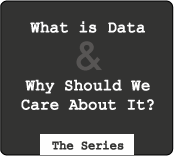 I’ve been fortunate to have worked with people from lots of different fields – statistics, ecology, computer science, engineering, design, etc. If I’ve learned anything, it’s that everyone has a different idea of what data is and why it matters.
I’ve been fortunate to have worked with people from lots of different fields – statistics, ecology, computer science, engineering, design, etc. If I’ve learned anything, it’s that everyone has a different idea of what data is and why it matters.
I’ve found that until I’ve understood what my collaborators mean by data and what they (and me) are trying to get out of a dataset, it’s near impossible to get anything useful done.
To make things a bit more clear (and for my own enjoyment), I asked a select group of people a single question:
What is data and why should we care about it?
Those who responded are from different areas of expertise, ranging from statistics, to business, to computer science, to design. Some names you’ll recognize while others will be new to you. All are doing interesting things with data.
I’ve been looking forward to this series for a couple of weeks now, and my hope is that you will gain a better understanding about what data is and how people are putting it to use. Keep an eye out for posts with the black square image above.
Here is who has answered so far:
- May the Data Be With You, Young Skywalker by Zach Gemignani
- Data Makes Reasonable Decision-making Possible by Andrew Gelman
- Increasing Data Literacy Across the General Public With Truth and Beauty by Matt Hurst
- Showing Historical & Cultural Connections and Mapping Influence by Mike Love
- Understanding Data, Not Just the Realm of Scientists in Ivory Towers by Hadley Wickham
- A Lesson in Recycling Chartjunk as Junk Art by Kaiser Fung
If you’d like to answer the question yourself, I’d love to see your response too, or if you write an answer on your own blog, please do post the link in the comments below.

 Visualize This: The FlowingData Guide to Design, Visualization, and Statistics (2nd Edition)
Visualize This: The FlowingData Guide to Design, Visualization, and Statistics (2nd Edition)

For a statistician, data are observations, rather than opinions, inferences, or theories. Thus they are at the heart of science. We can make scientific inferences, develop scientific theories, and even have scientific opinions, but ultimately they should be data-based.
Pingback: Why Does Data Matter to Google? | FlowingData